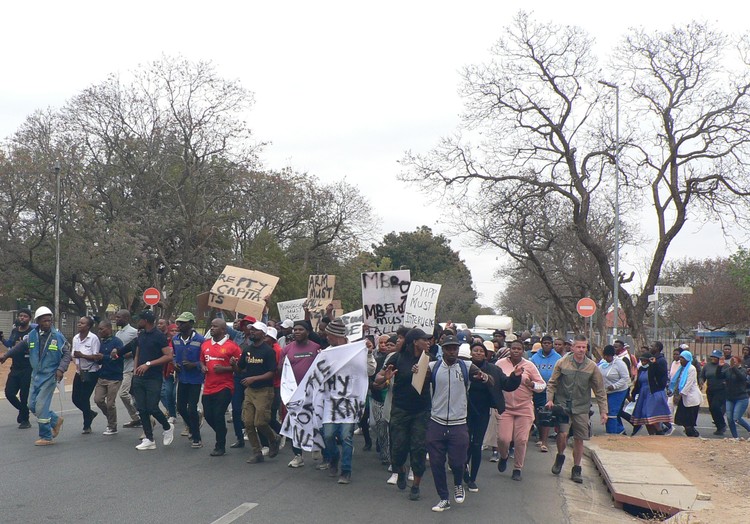Villagers live next to a platinum mine, but have no jobs
Residents of Limpopo’s Barok Ba Nkwana and Atok villages demand government speak to the mine on their behalf
People living in villages close to the Bokoni platinum mine about 60km south-east of Polokwane, march to the regional offices of the Department of Mineral and Petroleum Resources, to demand the government intervene to ensure local residents obtain employment at the mine. Photo: Bernard Chiguvare
- The Bokoni platinum mine, about 60km south-east of Polokwane, has recently reopened after being shuttered for six years.
- A month ago, residents of surrounding villages asked the Department of Mineral and Petroleum Resources to facilitate a meeting with mine management.
- The local residents believe they should be getting jobs at the mine, rather than people from other areas and towns being employed.
- With no such meeting having been arranged by the department, the villagers marched to the department’s offices in Polokwane on Wednesday, demanding they take action.
About 100 residents from villages close to the Bokoni Platinum Mines in Limpopo on Wednesday marched to the Department of Mineral and Petroleum Resources (DMR) in Polokwane, demanding the department intervene to ensure local residents are employed at the mine.
Having travelled about 60km by minibus taxis from the mining area south east of Polokwane, the protesters sang, blew whistles, and waved placards calling for the department’s intervention as they marched to the regional offices on Dorp Street.
Along with hiring local labour, the list of demands handed to acting DMR regional manager Vinesh Devchander included the department directing the mine to hold meaningful and proper consultations with the community on their 2024-2028 social and labour plans, and that the department make a legal assessment of the mine prohibiting community members from accessing the sprawling mine premises.
The march followed discussions between the department and Baroka Ba Nkwana community last month, where it was agreed the department should facilitate a joint meeting between Bokoni Platinum Mines - which is a subsidiary of African Rainbow Minerals - and the community to discuss their grievances.
Baroka Ba Nkwana Community Engagement Forum chairperson Kgotlelelo Mohlala told GroundUp the DMR had promised to intervene, but has failed to do so.
“This has forced us today to march to DMR offices in Polokwane. I am sure this is the only language DMR understands so that they can intervene,” said Mohlala.
Magerule Sekgobela, who lives next to the mine, said he sent his CV to the mine several times, and had approached mine management in person in an effort to get a job, to no avail.
Sekgobala said there were people working at the mine who came “from far areas, yet there are a lot of unemployed youths around the mine”.
Simon Makhura said he worked at the mine for ten years before it closes in 2017. He said when it resumed operations he applied to work there again, but was unsuccessful. Makhura said he has since found work at a mine in Rustenburg, and had to travel the 300km home every month to visit his family.
“For the ten years I worked at the mine I used to walk from home to the mine everyday but now I am renting a room in Rustenburg,” he said.
Vivian Thobejane, who participated in the march, said she believes mine management will only listen to the local community if they protest.
“I remember well that the mine’s old management was prepared to work with us after several protests. We are going to apply the same method to the new management,” Thobejane said.
According to Bokoni Platinum Mines website, after the mine had been inactive for six years, African Rainbow Minerals bought it from Anglo American Platinum and Atlatsa Resources Corporation in September 2022.
The website also states Bokoni Platinum Mines believes in “an all-inclusive approach that embraces the communities surrounding us, partners closely with tribal leaders, and collaborates with government agencies”.
The mine states they “actively engage with local communities to ensure their voices are heard, and their needs are met, promoting economic growth and social well-being”.
Receiving the letter of demands, Devchander said he would “forward it for further processes”.
The community demanded a response within seven days.
Support independent journalism
Donate using Payfast

Don't miss out on the latest news
We respect your privacy, and promise we won't spam you.
© 2024 GroundUp. This article is licensed under a Creative Commons Attribution-NoDerivatives 4.0 International License.
You may republish this article, so long as you credit the authors and GroundUp, and do not change the text. Please include a link back to the original article.
We put an invisible pixel in the article so that we can count traffic to republishers. All analytics tools are solely on our servers. We do not give our logs to any third party. Logs are deleted after two weeks. We do not use any IP address identifying information except to count regional traffic. We are solely interested in counting hits, not tracking users. If you republish, please do not delete the invisible pixel.

